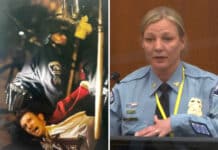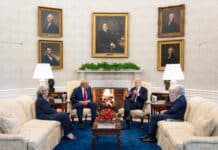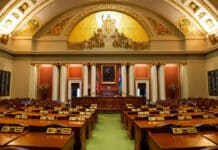BY: Andrea Mayer-Bruestle
Minnesota Media Faces New Restrictions from Politicians
Accredited representatives of the press, press associations, and radio and television stations must be given equal press privileges by the House. ~ Minnesota House of Representatives Rule 2.41
ST. PAUL, MINNESOTA March 8, 2016 marked the Opening Day of the 2016 Minnesota Legislative session, and with it a controversy over the number of Daily House Floor Passes issued to the media. Minnesota journalists took to Twitter to express their frustration with the allotted fifteen House Floor Daily Press Passes – one per “credentialed” media outlet:
To be clear: 15 press passes to the House every day. 1 per outlet. So @gspphoto is in for us. that’s it.
— j. patrick coolican (@jpcoolican) March 8, 2016
Minnesota Constitution requires house to be “open to the public during its sessions” public & media limited #mnleg pic.twitter.com/wGOFBuxVx2
— Mary Lahammer (@mlahammer) March 8, 2016
During a a discussion regarding pubic and press access to the House floor, it was argued that due to the construction taking place at the Capitol, the daily pass limit was necessary. This was not an argument many media members appreciated, especially the Iron Range journalists who were excluded from the House floor. (Video)
Rep. @JasonMetsa had an animated conversation with #mnleg Sgt at Arms Bob Meyerson over excluded Iron Range media. pic.twitter.com/1qAS83jMUZ
— Glen Stubbe (@gspphoto) March 8, 2016
DFL members argued that Speaker Daudt could have moved to have the House convene at another location as the Senate had decided to do during the construction this session. Daudt closed the discussion down by proclaiming the “points not well taken” and continued with the daily session.
Speaker Daudt says he’s not aware of any members of the press excluded from House Chambers. Ummm… with due respect… #mnleg
— Timothy Blotz (@TimBlotzFOX9) March 8, 2016
If the daily floor passes are limited to fifteen “credentialed” media outlets, will this be a repeat of the 2009 session, when there was a battle in the House to allow online media professionals access to House Committee meetings?
Furthermore, if only fifteen passes are being allotted to the press each day, what is the process to determine which fifteen media outlets are allowed those passes? A search of the House of Representatives website as well as a Google search for an outline of the process yielded no formal outline of the daily pass distribution process.
So the handing out of the very limited number of press credentials to cover #mnleg House is running late #crabby pic.twitter.com/Vdw4j43ixp
— Mary Lahammer (@mlahammer) March 8, 2016
Additionally, if only fifteen media outlets are allowed on the floor each day, and there is no publicized process as to how those fifteen passes are determined, what is stopping the House leadership from requesting or requiring that House Members only speak to those preferred reporters given floor passes each day? Will that preferential treatment of certain media outlets and professionals bleed over to other events?
For example, on Feb. 25, 2016, Alpha News reporter, Julia Erynn, was invited by SD31 GOP BPOU Vice-Chair/Regional-Leader Jonathon Fisher to moderate an SD-31 candidates’ forum that would include House Speaker Kurt Daudt, Tom Hackbarth, Calvin Bahr, and Michelle Benson. However, after Eyrnn accepted the invitation and exchanged several emails solidifying the details, Fisher informed her of “some bad news”: The elected state officials in SD31 refused to participate in the candidates’ forum if Alpha News was involved. When Erynn asked for the officials’ reason for the refusal, she was told that the candidates in question did not believe that Alpha News was a “real news organization,” even though the Minnesota Senate is currently processing Alpha News’ press application, and has issued a red press badge to Erynn. However, Alpha News has also been told that there is no press application available for the Minnesota House of Representatives right now.
What exactly are the politicians, particularly the leadership, trying to hide from the media this session? With no formal process publicly outlined for the distribution of Daily House Floor Passes, what is stopping the leadership from arbitrarily dictating which media organizations are “preferred” and will receive the passes for each session? Will this preferential treatment also lead to the leaders “recommending” to which media outlets House Members are allowed to speak? Are any of these actions legal under the Minnesota Constitution or the First Amendment?


















